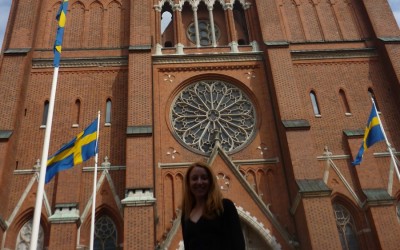Ever since my Cystic Fibrosis became public knowledge a few years ago (as a result of my appearance on an international TV show), I’ve frequently been asked, “How are you able to sing opera when you have CF?!”
I’ve never really known how to answer that question . . . since CF is a chronic, genetic disease, I’ve never known life without it, and I have no frame of reference for what singing would be like otherwise. Asking me how I’m able to sing is like asking a sea turtle how they’re able to swim so far with that huge shell on their back…. they would probably look at you cockeyed and say, “Why would it stop me? I was made to swim, and this is part of who I am.”
When someone asked me this question the other day, I realized that my issue with the question is that it presupposes that CF is an obstacle to success as a singer. I had to flip the question on its head in order for it to really make sense to me, “How has living with CF made me a better opera singer?”
Breath awareness . . . without judgment
Classical singers work constantly on improving their breathing technique. Common vocal exercises focus on establishing a solid base of breath support to ensure a steady stream of air, and learning to sing progressively longer phrases without interruption. This foundation is what every other aspect of singing depends on – pitch accuracy, agility, and dynamic flexibility (the ability to fluidly move between soft and loud sounds). With practice, this breath support becomes second nature, freeing the singer so they can focus on artistry, emotion, and communicating what your character has to say.
CF is a progressive disease, with a gradual loss in lung function over time due to chronic infections and scarring that close off airways in the lungs. As a kid, my lung function tests were often “supernormal” – which means they were above 100% of what was predicted for a girl my age and height. Even so, sustaining long vocal phrases was more of a challenge for me in voice lessons than it was for other kids. But I persisted, and as a freshman in high school I won our district solo competition and went on to compete at state. I was flummoxed by the win and thought it was a fluke – how could I possibly have measured up to all those other people who seemed to sing long phrases so effortlessly?

How I remember the 8th grade.
But what I didn’t realize at the time was that my focus on that one fundamental thing – breath support – was giving me a solid base of body awareness and knowledge, allowing me to improve those other parts of vocal technique. The adjudicator of that high school competition commented on my “lovely legato,” agility, and diction, when I was sure she was going to say, “Ah, YOU have issues with your peripheral airways.” That’s not what she heard. It’s not what she heard, at all. I had to let go of my preconceived judgments about what I was capable of and say, “Hey, I CAN do this on a level that’s competitive.”
Over 20 years later, my lung function is now only 2/3 of what it was at that time. And yet precisely because of that fundamental work I’ve done on my breath support over the years, I’m able to sing on an operatic stage . . . I’m currently preparing for my role as Olga Kromov in The Merry Widow, in my 10th season at Tacoma Opera. As my lung function has gradually fallen over time, eaten away by a chronic infection of pseudomonas bacteria, I have had to become increasingly aware of my lungs, without judging them or myself harshly when they fall short of my lofty goals. Which accordingly makes me more grateful for each note that they let me sing, making me a better and more joyful artist.
Mental toughness
With never-ending auditions, ceaseless rejections, and demanding rehearsal and performance schedules, the life of a singer is not for the faint of heart. Singing professionally can demoralizing at times, and you have to learn from mistakes and then let them go – floating from high moment to high moment and using that to sustain you, or even better – acknowledging that you are valuable as an artist even when it feels like the world around you doesn’t see it. It takes a level of persistence and tenacity I’ve experienced in only a few other areas of my life . . . like managing CF.
CF comes with a whole host of unpleasant realities that you have to face in order to live successfully with this disease. Even when you’re healthy, it takes organizing your life to the hilt so that you have enough time for treatments and doctor’s appointments and calling insurance companies and exercise and treatments and getting healthy meals and . . . sleeping. Getting comfortable with coughing the ickiness inside your lungs out into the daylight where you (and everyone nearby) can see it. Putting off the short-term pleasure of a night out the for long-term gain of a good night’s sleep. No matter how you try to outrun it, if you procrastinate or ignore these things, the disease will catch up with you and rear its ugly head.
But the truth of it is, even when you do everything right you can still get sick, and it can be downright demoralizing. There’s a time to curl up in a ball and let yourself cry over your frustrations. You can allow yourself time and space to heal, and maybe reassess your strategy and priorities. But at the end of the day, you have to stick with it and keep going. It’s the only option really, because what’s the alternative?
Singing, and singing opera in particular, takes that same tenacity and determination to simply keep going. I think when I first started auditioning for operatic roles, it was simply because I wanted to find out if I was capable of doing it. I love a challenge, and tend to lose interest in things if they come easily to me. Had CF not presented me this challenge, staring me in the face and saying, “I dare you to do this,” I might not have gotten this far. It made me step up to see what I could achieve if I gave it my all.

OK so John McCain never actually said this to me but you know he would.
The otherwise-indefinable Truth
One of the things about being born with a chronic, fatal disease is that you start considering your own mortality at a younger age than most people do. When I was born in 1979, the average survival age for a person with cystic fibrosis was the mid-to-late teens (for people born now it’s the early forties). I think I was about ten years old when I saw a an obituary photo in the local newspaper of another little girl with CF about my age, and that was the first time it really hit home. In my twenties, I started meeting other people with CF online . . . and within a few years lost many of them to complications of the disease. As best I can figure, only about 25% of people with CF born in the US the same year I was are still alive today – 1 in 4*. How was I one of the lucky ones, who has received so many days, so many breaths, so many moments on this earth? And to be able to share music with my voice, at that?
With that gratitude always in the back of my mind, making music comes a joyful celebration of these gifts I have been given. And an audience can pick up on that, even if they don’t know why. During my 20+ years as a professional musician I’ve come to believe that at its core, music is about human connection. Our experiences, our stories, our emotions become more real to other human beings when they are communicated through singing.
A single pure note hanging in the air as it resonates through a cathedral. A jazz band improvising something new and building off each other’s creativity as they inspire each other. A triumphant opera finale where as the notes of the final cadence fade out, it leaves a silence that the audience hesitates to break with applause.
There’s something indescribable about those moments, reaching beyond the plane of this everyday human existence, giving us a glimpse into something larger than ourselves. Call it God, call it the Universe – whatever helps you understand it. When you have these beautiful moments making and feeling music, you don’t want them to end – you bathe in the sound, savoring it while you can. Experiencing the sheer gratitude of walking on this planet and sharing something beautiful with other humans. What an honor . . . what a delight.
When I put all of that together, I can’t help but wonder if my successes thus far have come not in spite of CF, but in a way they came about because of it. What would you decide to do with each day, each breath, if you weren’t sure how many you had? Because that’s not just true for me . . . it’s true for all of us.

Preach, Gandalf.
*https://www.cff.org/Our-Research/CF-Patient-Registry/2015-Patient-Registry-Annual-Data-Report.pdf
Want more stuff like this?
Subscribe to my e-mail newsletter for news, writings, and special events!







